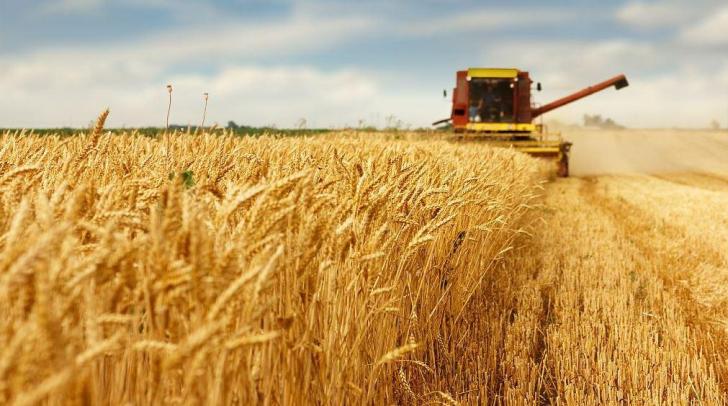News / National
Zimbabwe achieves record wheat harvest
03 Dec 2024 at 08:48hrs |
0 Views

Zimbabwe has achieved a record-breaking wheat harvest, with deliveries reaching 563,961 tonnes, significantly surpassing last year's 467,000 tonnes. This milestone marks the nation's largest wheat harvest since the inception of commercial wheat farming in 1966 and ensures self-sufficiency for the third consecutive year.
The bumper harvest comes at a critical time, as global wheat supply chains face disruption due to geopolitical conflicts, particularly in Eastern Europe. The success allows Zimbabwe to sidestep these challenges, strengthening its food security and reducing dependency on imports.
Wheat was cultivated on 120,000 hectares this year, a notable 30% increase from the 91,000 hectares planted in 2023. This expansion is attributed to deliberate planning and support for farmers. In his weekly report, Mr. Leonard Munamati, chief director of the Agricultural and Rural Development Advisory Services (ARDAS), highlighted the nation's focused efforts to achieve this feat.
"Having achieved a new record of 91,000 hectares of wheat in 2023, the area planted increased by 30% to 119,594 hectares in 2024. The total wheat produced this year is yet another record-breaking achievement of 563,961 tonnes," said Mr. Munamati.
Key factors contributing to the success included prioritising electricity supply during the growing season, improved irrigation systems, pest control measures, and access to critical farming inputs such as seeds, fertilisers, and financing.
Mashonaland provinces were the top contributors to this record harvest: Mashonaland West: 174,580 tonnes from 33,303 hectares. Mashonaland Central: 150,007 tonnes from 29,574 hectares. Mashonaland East: 98,915 tonnes from 21,997 hectares.
Other provinces also made valuable contributions, Manicaland: 45,869 tonnes from 13,216 hectares. Midlands: 66,446 tonnes from 12,081 hectares. Masvingo: 8,322 tonnes from 2,925 hectares. Matabeleland North: 5,930 tonnes from 1,913 hectares. Matabeleland South: 13,822 tonnes from 3,115 hectares.
Mr. Paul Zakariya, secretary-general of the Zimbabwe Commercial Farmers Union, underscored the broader economic benefits of sustained wheat production.
"If we maintain this standard, we generate foreign currency and further develop wheat production industries. This means there will be no reason for importing wheat because we will be exporting our hard-earned cash," he said.
The current grain stocks at the Grain Marketing Board (GMB) stand at 253,665 tonnes, including 235,142 tonnes of wheat. These reserves bolster national food security and lay a foundation for future growth in the agricultural sector.
The government's shift towards a wheat-based food security strategy, especially in light of drought-induced challenges to summer crops, has proven effective. Zimbabwe's achievement reflects the importance of coordinated efforts, innovation, and resource allocation in agriculture.
The nation now sets its sights on leveraging this success to build export capacity and further cement its position as a wheat production leader in the region.
The bumper harvest comes at a critical time, as global wheat supply chains face disruption due to geopolitical conflicts, particularly in Eastern Europe. The success allows Zimbabwe to sidestep these challenges, strengthening its food security and reducing dependency on imports.
Wheat was cultivated on 120,000 hectares this year, a notable 30% increase from the 91,000 hectares planted in 2023. This expansion is attributed to deliberate planning and support for farmers. In his weekly report, Mr. Leonard Munamati, chief director of the Agricultural and Rural Development Advisory Services (ARDAS), highlighted the nation's focused efforts to achieve this feat.
"Having achieved a new record of 91,000 hectares of wheat in 2023, the area planted increased by 30% to 119,594 hectares in 2024. The total wheat produced this year is yet another record-breaking achievement of 563,961 tonnes," said Mr. Munamati.
Key factors contributing to the success included prioritising electricity supply during the growing season, improved irrigation systems, pest control measures, and access to critical farming inputs such as seeds, fertilisers, and financing.
Mashonaland provinces were the top contributors to this record harvest: Mashonaland West: 174,580 tonnes from 33,303 hectares. Mashonaland Central: 150,007 tonnes from 29,574 hectares. Mashonaland East: 98,915 tonnes from 21,997 hectares.
Other provinces also made valuable contributions, Manicaland: 45,869 tonnes from 13,216 hectares. Midlands: 66,446 tonnes from 12,081 hectares. Masvingo: 8,322 tonnes from 2,925 hectares. Matabeleland North: 5,930 tonnes from 1,913 hectares. Matabeleland South: 13,822 tonnes from 3,115 hectares.
Mr. Paul Zakariya, secretary-general of the Zimbabwe Commercial Farmers Union, underscored the broader economic benefits of sustained wheat production.
"If we maintain this standard, we generate foreign currency and further develop wheat production industries. This means there will be no reason for importing wheat because we will be exporting our hard-earned cash," he said.
The current grain stocks at the Grain Marketing Board (GMB) stand at 253,665 tonnes, including 235,142 tonnes of wheat. These reserves bolster national food security and lay a foundation for future growth in the agricultural sector.
The government's shift towards a wheat-based food security strategy, especially in light of drought-induced challenges to summer crops, has proven effective. Zimbabwe's achievement reflects the importance of coordinated efforts, innovation, and resource allocation in agriculture.
The nation now sets its sights on leveraging this success to build export capacity and further cement its position as a wheat production leader in the region.
Source - The Herald
Join the discussion
Loading comments…


































